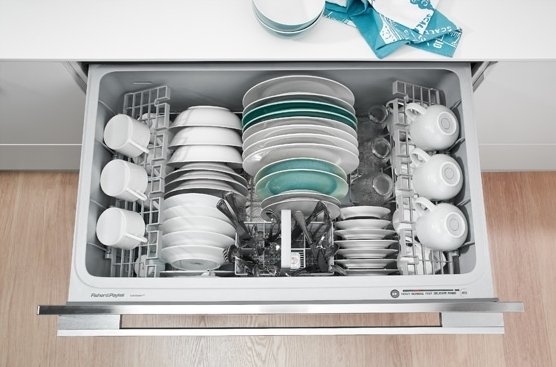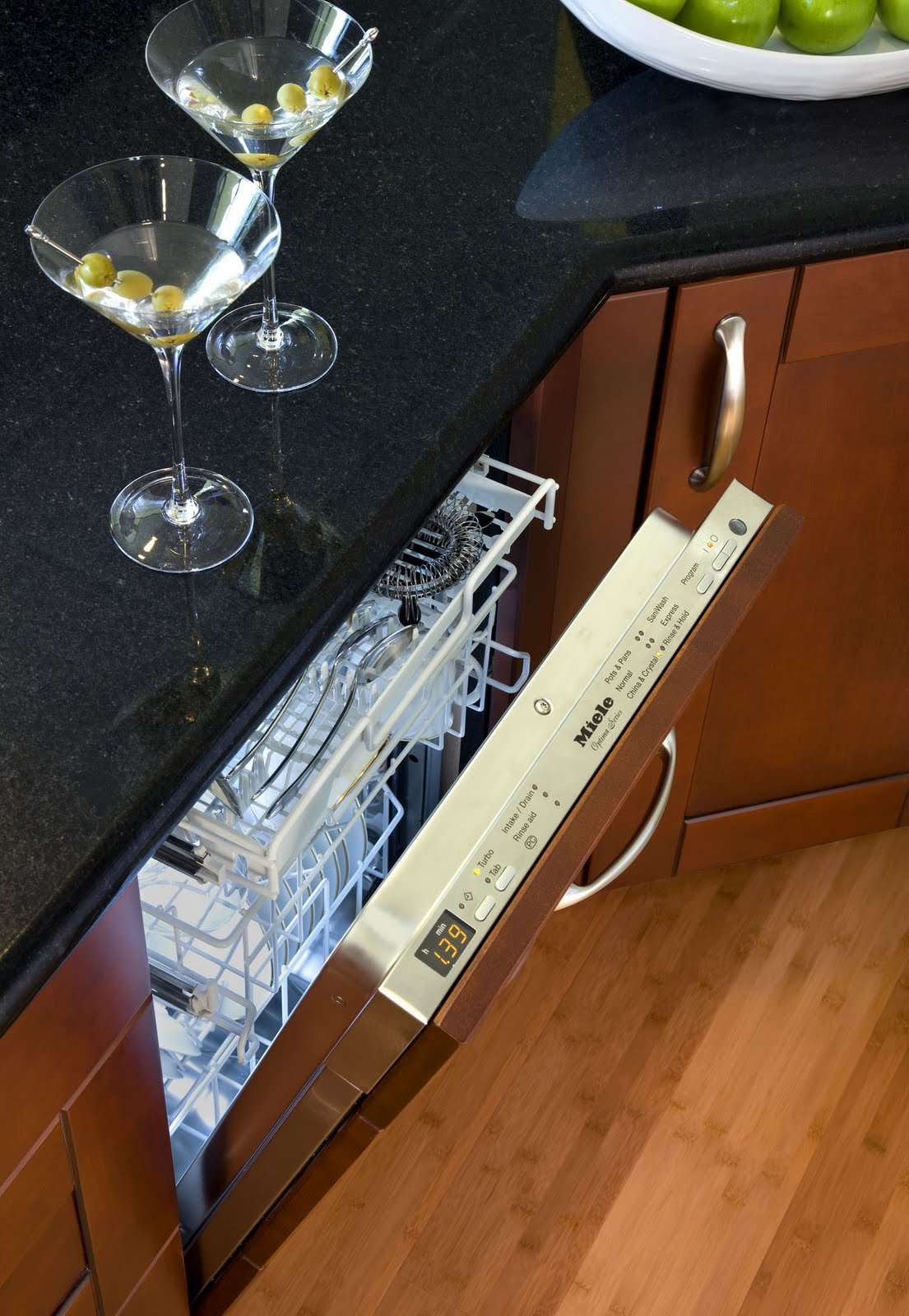How does it work, why does it work and how can you break a dishwasher?
Table of Contents
Types of Dishwashers
Built-in
Portable
Drawer
Countertop
Integrated
Dishwasher Sizes
Full size
Slimline
Compact
Dishwasher Features
Sound Reduction
Sensor Wash
Steam Prewash
Flexible Racks
Stainless Steel Interior
Plastic Interior
For many of us, having the option between a dishwasher and hand washing all of our dishes is a no-brainer. We’ll take the dishwasher any day. So, what happens if your current dishwasher breaks? As in we’ve come to your home, done everything we could and told you that the price to repair it would be more than replacing it. Well, at that point, you might as well let your inner shopper out and go trawling websites to find that new dishwasher you were considering. This week we’re looking at what varieties dishwashers come in and what features you might see. Let’s dive in.
Types of Dishwasher
Built-in Dishwasher
A built-in dishwasher is the most common type of dishwasher in the modern American household. These are the ones that go under your bench or counters. These are built into your wall, piping, drainage, and all. Naturally, this means that they don’t move easily, if at all. (Apologies to those of you that love to rearrange your homes on a regular basis.) Two upsides to that fixed position though:
-The noises are muffled by the surrounding cabinets and their contents.
- Since they’re in the kitchen, they’re central to the cooking and dining process, making for easy access and clean-up.
Portable Dishwashers
Portable dishwashers are a great option if you’ve got a more empty or pared-down kitchen. They’re freestanding devices that you can move around anywhere you need. They can provide extra countertop space when you need it, such as if you’re doing a lot of food prep. They work anywhere, and you can connect them to water and drainage. These are ideal for a couple or if you’re living on your own, as they are better at handling small loads.
Drawer Dishwashers
Although we mentioned them in our tiny home post, we have yet to touch on these in-depth. Drawer dishwashers are relatively new to the appliance scene compared to built-ins. Instead of opening down and out, they pull out like a sliding drawer. They are very easy to use for those with difficulty bending as they load from the top.
An open drawer dishwasher, showing multiple levels and space for six place settings.
They’re ideal for smaller loads, although they do come in single or double drawer formats. No matter which size you choose, they are still not as spacious as your standard built-in of today.
One major downside is that because they are such a new concept, makers are still in the process of working the kinks out. Drawer dishwashers are harder to clean, more expensive, and are more prone to breakage than traditional washers.
Countertop Dishwashers
A compact dishwasher on the kitchen counter, along with the rack sitting off to the right.
The supremely shiny countertop dishwashers are a very new concept. They come in several different sizes, but are still smaller than a drawer dishwasher. They don’t need to be builtin and can be moved around very easily. They don’t even need dedicated water o drainage and can instead be hooked up to your sink.
They use very little water and so are ideal for places with ongoing water shortages. Due to their size, they may not be able to handle all of your pots and pans and probably not the majority of calderas or woks.
Integrated Washers
A fully integrated dishwasher in the kitchen, with the control panel shown off. You can’t see the cabinetry panel as well, but you can see the drawer pull and the staining of the panel which match others within the kitchen.
Our last category of washer types is not based on size or shape, but on how wel it disappears. These are designed to fit in with a very uniform kitchen look. An integrated dishwasher might come with or be ready for panels that match the cabinets in your kitchen. They are built into the cabinetry, much like the built-ins are, but they are split into two categories. Either a ‘fully integrated’ dishwasher or a ‘semi integrated’ dishwasher. A fully integrated unit won’t be any different from a normal cabinet in appearance and instead will have all of your controls on the inside of the machine. A semi-integrated dishwasher on the other hand will have the control panel on the outside but it will still have the cabinetry panel as well.
Dishwasher Sizes
Now that we’ve looked at the different types of dishwashers let’s quickly look at some of the most common size-related terms you’re likely to encounter.
These are going to be applied to your built-in dishwashers, although not always. For that reason, we advise carefully checking descriptions before you purchase.
Full Size
These are the most common variety of dishwasher. They’re designed to hold between 12 and 16 place settings at once. The idea is to cut down on how often you’re running the dishwasher by doing the largest load possible at once. These will usually measure in at 24” wide, 24” deep, and 35” high.
A slimline dishwasher with an additional third rack.
Slimline
Take the full-size dishwasher and shave off 6” or so. That’s a slimline. Measuring in typically at 18” wide, 24” deep and 35” high, they are great for a galley kitchen.
Compact
A compact dishwasher is very small and will be roughly the size of your microwave in terms of counter space. The smallest we found was the Faberware Portable dishwasher at 17'' wide, 16.5'' deep, and 17” high.
Features
Sound Reduction
We’re starting off with this one because dishwashers can be noisy. If your bedroom is right across from the kitchen, you know what we mean. This is built into the design of the dishwasher and dramatically cuts down on the amount of noise heard throughout the house.
Sensor Wash
This will run a scan over your dishes before the wash begins to assess how dirty they are and adjust the cycle accordingly. This not only saves energy and water, but it also saves on your bills.
Steam Prewash
A steam prewash will heat water and fill the dishwasher with steam before the actual cycle starts so as to loosen up food debris, grease, and other detritus.
Flexible Racks
A flexible rack system lets you move the racks in your dishwasher around, simple, right? Sometimes you need more space on top, and sometimes you need more space on the bottom row. A great example is after doing a lot of cooking, and you don’t want to hand wash all of your large pots and pans. Now you can move your racks around to accommodate them.
Stainless Steel Interior
A stainless steel interior is great because it’s more energy efficient and better sanitizing. They can run hotter temperatures because the steel can handle the heat. The downsides, though, are twofold.
They’re more expensive.
They will show hard water stains and calcium build-up.
Plastic Interior
A plastic interior is the most common and more cost-effective interior option when purchasing a dishwasher. They’re easier to clean, and they last a long time. They have their downsides, too, though.
They can’t run as hot as a dishwasher with a stainless steel interior because the plastic would begin to melt at those temperatures.
They are noisier as plastic isn’t an excellent insulator of sound.
That’s it for this month’s Deep Dive! Did you know about all of these features? Are there ones that you have questions about? Let us know over on our Facebook page; we’d love to hear from you.
If, on the other hand, you wound up here not because you’re buying a new dishwasher but because you need your current one fixed, look no further. We service all types of dishwashers, and we can help with yours. Just give us a call at (214) 599-0055, or set up an appointment on our page. At Appliance Rescue Service, we’re here for you.
Additional Reading
Dishwasher Dangers, What Doesn’t Belong
How To Deep Clean Your Dishwasher




